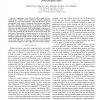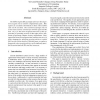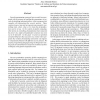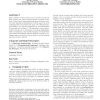77
Voted
ICC
2007
IEEE
15 years 7 months ago
2007
IEEE
Abstract— Application Level Gateways and firewalls are commonly used to enforce security policies at network boundaries, especially in large-sized business networks. However, se...
78
Voted
ICC
2007
IEEE
15 years 7 months ago
2007
IEEE
— Organizations use security policies to regulate how they share and exchange information, e.g., under what conditions data can be exchanged, what protocols are to be used, who i...
101
Voted
AINA
2007
IEEE
15 years 7 months ago
2007
IEEE
The Mobile Agent (MA) paradigm advocates the migration of agent code to achieve computational goals. MAs require an executable environment on hosts where mobile code can be execut...
118
Voted
IEEEARES
2008
IEEE
15 years 7 months ago
2008
IEEE
During interoperability exchanges, organizations are jointly conducting computation and sharing tasks. However, organizations can have different security policies. To guarantee g...
105
Voted
CONCUR
2009
Springer
15 years 7 months ago
2009
Springer
Several programming constructs have recently been proposed with the purpose of enabling the programmer to encode declassifying information flows within a program that complies wi...
105
click to vote
PLDI
2009
ACM
15 years 7 months ago
2009
ACM
Decentralized information flow control (DIFC) is a promising model for writing programs with powerful, end-to-end security guarantees. Current DIFC systems that run on commodity ...
AOSD
2010
ACM
15 years 7 months ago
2010
ACM
Many software security policies can be encoded as aspects that identify and guard security-relevant program operations. Bugs in these aspectually-implemented security policies oft...
124
Voted
WWW
2010
ACM
15 years 7 months ago
2010
ACM
Alhambra is a browser-based system designed to enforce and test web browser security policies. At the core of Alhambra is a policyenhanced browser supporting fine-grain security ...
203
Voted
SIGMOD
2009
ACM
16 years 24 days ago
2009
ACM
This paper presents SELinks, a programming language focused on building secure multi-tier web applications. SELinks provides a uniform programming model, in the style of LINQ and ...




